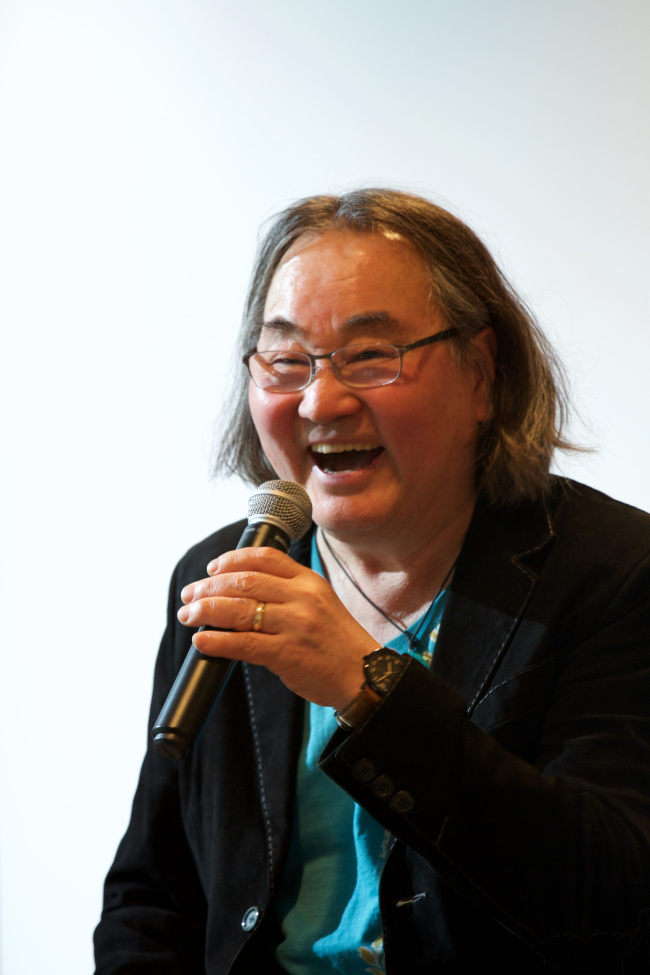A little over four decades ago, folk singer Hahn Dae-soo invited listeners to come with him down a “Long Long Road” with his debut album.
The singer, who was briefly banned for what the authoritarian regime at that time called “subversive anti-regime” lyrics, introduced the concept of singer-songwriter to the Korean music scene.
His best songs, such as “Land of Happiness” and “Give Me Water” remain classics to this day.
Now, 40 years after his first album, the folk music icon looks back on his musical life with a commemorative album, book, and concert.
The tribute album, a thirteen-track album called “Rebirth,” is unusual in many ways.
 |
| Hahn Dae-soo. (LG Arts Center) |
“This is a rare, high-quality folk rock album,” said Hahn at a press conference at LG Arts Center in Seoul on Wednesday. The rarity was, according to Hahn, due to the difficulties of producing a folk album in today’s Korean music industry.
“There are independent artists who release home-recorded project albums, of course, but an album with this level of scale and quality is virtually a miracle. It was possible because the wonderful people who were involved were so open about donating their talent.”
The album was created over a year as a special project at the radio channel CBS. The station designed the “Making Radio: Hahn Dae-soo 40th Anniversary Project,” which took to the airwaves to openly recruit artists, designers and marketers. Listeners were invited to share their opinions and contribute to decision-making at every step of the process. Funding for the project was also collected through crowdfunding and individual donations.
“It was a huge experiment for radio,” said Yeo Mi-young, the radio producer in charge of the project. “I was amazed to see the response. The whole process feels like a miracle.”
The experiment was a success, not only in producing a remarkable album with all-star credits but in paying tribute to Hahn’s music, which has become a symbol of freedom and rebellion here.
“There are so many musicians out there,” said rock singer Kang San-ae, who covered Hahn‘s song “Sorrow of Ock” on the album. “The fact that so many artists wanted to reinterpret and share Hahn Dae-soo’s music demonstrates the truly artistic value of his work.”
Other high-caliber artists such as Jeon In-gwon, Yoon Do-hyun and Shin Dae-chul came to lend their voices and instrumental talents to the project, giving Hahn’s songs a true “rebirth.”
“I’m so grateful to everyone,” said Hahn. “Music is something that is enjoyable and gives us comfort, but the process of creating it is extremely arduous. I know it was not easy.”
Hahn himself sang with the artists on over half the tracks, and included two new songs of his own, “I Surrender” and “My Love.”
“The producer wanted to put in some new tracks, but I couldn’t write anything new,” Hahn said. “Thankfully, I had kept my notebooks from when I was in high school, and I found a song that I had never recorded. That became ‘My Love.’”
The tribute songs will be performed live for the first time at a two-day concert called “Reverse, Rebirth” at the LG Arts Center on April 25 and 26. Hahn, who became famous for his avant-garde concert in 1969 at the Drama Center in Jung-gu, Seoul, said that he had another surprising performance planned.
“At that concert, I started out with a smell using incense. Then I used train sounds and the ticking sounds of a clock to build up the audience, then came in playing a saw. I learned from Pink Floyd’s playbook,” Hahn said, with a boisterous laugh. “I can‘t tell you what I have planned next, but there’s definitely something.”
At the upcoming concert, Hahn and the artists on his tribute album will be joined by other artists such as the Barberettes, a girl group known for their retro sounds.
To accompany the album and concert, Hahn has also prepared a book, “Love is Love, Life is Life,” containing the lyrics of 50 songs and the stories behind them.
The book’s significance is encapsulated in the first line of his prologue ― “As I organized my past songs, I felt that this book would be my autobiography.”
Accompanied with a book of sheet music, “Love is Love, Life is Life” is to go on sale April 10.
When asked about the importance that he personally attached to folk music in Korea, Hahn said, “Rock and folk are two genres that really speak to the public. Dance music is about making the body move, but folk and rock songs can be enjoyed on their own, both for their vocal and instrumental performances.
The singer, who also worked briefly as a reporter of The Korea Herald, added, ”The lyrics can talk about topics like terror and crime. It’s a storytelling process. This kind of music must continue.”
By Won Ho-jung (hjwon@heraldcorp.com)

